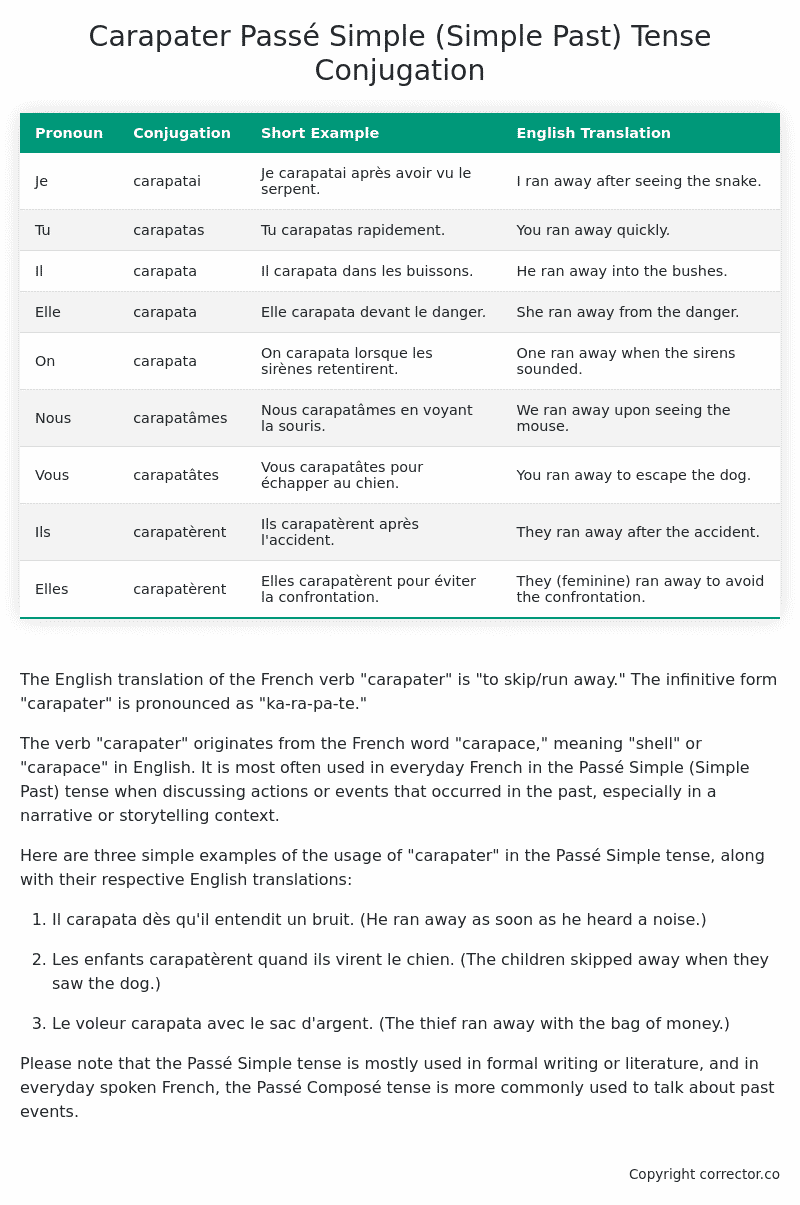Passé Simple (Simple Past) Tense Conjugation of the French Verb carapater
Introduction to the verb carapater
The English translation of the French verb “carapater” is “to skip/run away.” The infinitive form “carapater” is pronounced as “ka-ra-pa-te.”
The verb “carapater” originates from the French word “carapace,” meaning “shell” or “carapace” in English. It is most often used in everyday French in the Passé Simple (Simple Past) tense when discussing actions or events that occurred in the past, especially in a narrative or storytelling context.
Here are three simple examples of the usage of “carapater” in the Passé Simple tense, along with their respective English translations:
-
Il carapata dès qu’il entendit un bruit.
(He ran away as soon as he heard a noise.) -
Les enfants carapatèrent quand ils virent le chien.
(The children skipped away when they saw the dog.) -
Le voleur carapata avec le sac d’argent.
(The thief ran away with the bag of money.)
Please note that the Passé Simple tense is mostly used in formal writing or literature, and in everyday spoken French, the Passé Composé tense is more commonly used to talk about past events.
Table of the Passé Simple (Simple Past) Tense Conjugation of carapater
| Pronoun | Conjugation | Short Example | English Translation |
|---|---|---|---|
| Je | carapatai | Je carapatai après avoir vu le serpent. | I ran away after seeing the snake. |
| Tu | carapatas | Tu carapatas rapidement. | You ran away quickly. |
| Il | carapata | Il carapata dans les buissons. | He ran away into the bushes. |
| Elle | carapata | Elle carapata devant le danger. | She ran away from the danger. |
| On | carapata | On carapata lorsque les sirènes retentirent. | One ran away when the sirens sounded. |
| Nous | carapatâmes | Nous carapatâmes en voyant la souris. | We ran away upon seeing the mouse. |
| Vous | carapatâtes | Vous carapatâtes pour échapper au chien. | You ran away to escape the dog. |
| Ils | carapatèrent | Ils carapatèrent après l’accident. | They ran away after the accident. |
| Elles | carapatèrent | Elles carapatèrent pour éviter la confrontation. | They (feminine) ran away to avoid the confrontation. |
Other Conjugations for Carapater.
Le Present (Present Tense) Conjugation of the French Verb carapater
Imparfait (Imperfect) Tense Conjugation of the French Verb carapater
Passé Simple (Simple Past) Tense Conjugation of the French Verb carapater (You’re reading it right now!)
Passé Composé (Present Perfect) Tense Conjugation of the French Verb carapater
Futur Simple (Simple Future) Tense Conjugation of the French Verb carapater
Futur Proche (Near Future) Tense Conjugation of the French Verb carapater
Plus-que-parfait (Pluperfect) Tense Conjugation of the French Verb carapater
Passé Antérieur (Past Anterior) Tense Conjugation of the French Verb carapater
Futur Antérieur (Future Anterior) Tense Conjugation of the French Verb carapater
Subjonctif Présent (Subjunctive Present) Tense Conjugation of the French Verb carapater
Subjonctif Passé (Subjunctive Past) Tense Conjugation of the French Verb carapater
Subjonctif Imparfait (Subjunctive Imperfect) Tense Conjugation of the French Verb carapater
Subjonctif Plus-que-parfait (Subjunctive Pluperfect) Tense Conjugation of the French Verb carapater
Conditionnel Présent (Conditional Present) Tense Conjugation of the French Verb carapater
Conditionnel Passé (Conditional Past) Tense Conjugation of the French Verb carapater
Conditionnel Passé II (Conditional Past II) Tense Conjugation of the French Verb carapater
L’impératif Présent (Imperative Present) Tense Conjugation of the French Verb carapater
L’impératif Passé (Imperative Past) Tense Conjugation of the French Verb carapater
L’infinitif Présent (Infinitive Present) Tense Conjugation of the French Verb carapater
L’infinitif Passé (Infinitive Past) Tense Conjugation of the French Verb carapater
Le Participe Présent (Present Participle) Tense Conjugation of the French Verb carapater
Le Participe Passé (Past Participle) Tense Conjugation of the French Verb carapater
Struggling with French verbs or the language in general? Why not use our free French Grammar Checker – no registration required!
Get a FREE Download Study Sheet of this Conjugation 🔥
Simply right click the image below, click “save image” and get your free reference for the carapater Passé Simple tense conjugation!

Carapater – About the French Passé Simple (Simple Past) Tense
Formation
Usage
Narration
Historical Context
Interactions with other tenses
Passé Composé
Imparfait
Conditional and Subjunctive
Summary
I hope you enjoyed this article on the verb carapater. Still in a learning mood? Check out another TOTALLY random French verb conjugation!


